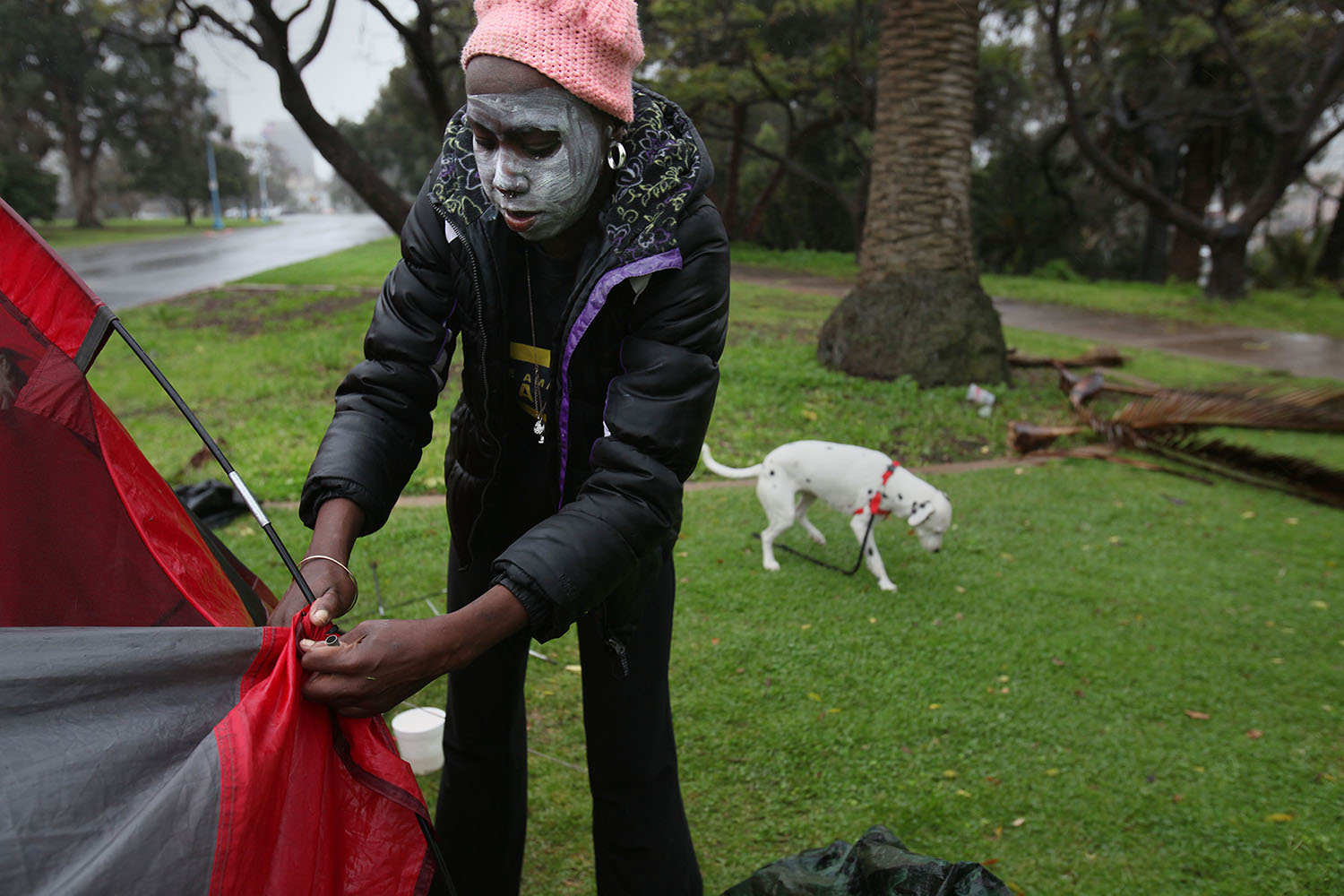Honey
Honey (Lakeesha), 39, was the third child to her mother and father, but her father left the family when she was still in utero. Her mother stabbed him with an ice pick as he was leaving, moving to Ohio, with her mother’s cousin. So she never met her father, (“I don’t call him my daddy cuz he never was, but he was my father”), until she was 23.
She was born in Louisiana where she grew up and married a man in the military. They are separated, since he doesn’t want a divorce. They came to San Diego when he was stationed here. Initially she worked as a phlebotomist, “I’m a vein-ologist,” she declared, by way of explaining her training. For 13 years she drove between San Diego and Redding for a company that employed her part time. When the owner of the company sold out, Honey became a consultant, which meant she no longer had health benefits or a 401K.
In despair, without a source of income or a home or husband, she sat on a bench on 6th Avenue near Balboa Park. She gazed over at the park and felt a calm. “It’s so beautiful here,” she said. So she moved into the park. Beautiful maybe, but never peaceful. She is constantly visited by the police, other homeless people steal from her, even park rangers rummage through her belongings when they think she’s not around. She’s seen a female ranger leaving her tent with an article of clothing, then drive away. Nice people come by and offer her donations of food or clothing, but it feels creepy, she said, because they get out of the car and say, “Can you use this?” holding up an item. Then they put the item on the curb and drive away. “They don’t actually want to meet me or get too close to me.
A year ago in April she was raped for the first time. A homeless man who knew she liked fountain drinks brought her a large, sweet soda, with a date rape drug in it. “He waited till I set up my tent, then walked over and handed me a soda and in a few minutes I was passed out. I came to and he was doing all kinds of things to me. He was there all night and the next morning.” The abuse didn’t stop there; it happened again. She has seen him leaning on cars, joking with the police and other guys living in the park.
“I believe you have to treat people right, be honest with people. I told the police about my rape and I have evidence and they did nothing.”
She sees the guys circling her in the park like a shadowy pack of wolves. They see she’s something shiny and bright, so they’re drawn to her. But she can see most of them are afraid of her because she speaks her mind. People bring her stuff, name brand clothes, a new tent, a bicycle. She had a nice, vintage ten-speed bicycle someone gave her, and it was stolen from her while she was sleeping one night. The thief sold it for $5,000 she said. She still sees the guy around too, but there’s nothing she can do about it, she said, since she didn’t have any paperwork saying it was hers. “People don’t listen to the homeless anyway. They don’t see crimes to the homeless as crimes. The cops just look the other way.
“People steal from me,” she went on. “Why? I give to people when I can, so why steal? I’m never mean to people but they just take advantage of me.”
Even her dog was given to her. She was over on the grass one day, and a man practically threw Jalila at her, telling her she needed a dog for protection. She’d seen them beating the dog and even holding the dog down so another dog could mate with her. So she kept Jalila basically to protected her. The same man who originally gave her Jalila came and said she owed them $200 for the dog. She sent his away. “How is it I owe him for something that’s already mine?” Jalila returned the favor. She actually pulled Honey back from the edge of the bridge over the 163 freeway not long ago, when Honey was feeling despondent, like there was nothing left to live for. “She pulled on my coat and pulled me back. And I realized I had her to live for at least.”
Now she wants to create a nonprofit to help others feeling despair or worthlessness, to find that part of themselves that is valuable and worthy of praise.
Every time she brought the two broken parts of a tent pole close enough together to tie them, wind gusts ballooned the shell of her home high overhead. She tried to tie the frayed, stubby ends together around a stake, but as soon as she let go control of the poles, the tent collapsed again, soaking the contents of her tent. She might as well have been swimming in a fish bowl. The wet clothes she wore hugged her thin frame. Her face, painted white with a cleansing cream, offered the surreal vision of a mime dancing with a tent in the rain.
Despite the rain, she laid out her wet towels and blankets, trying to secure the corners of her tarp over the top of her tent that now resembled a lopsided tetrahedron. Each time the wind unfurled her knots the tarp coiled upwards like being sucked into a tornado. Undaunted, Honey kept working. With the help of a neighbor, she finally secured her tent.




